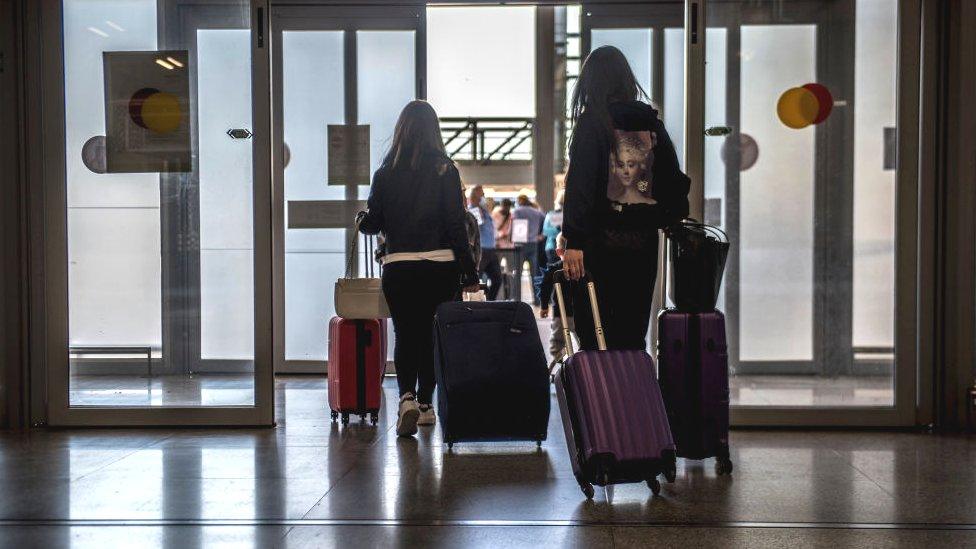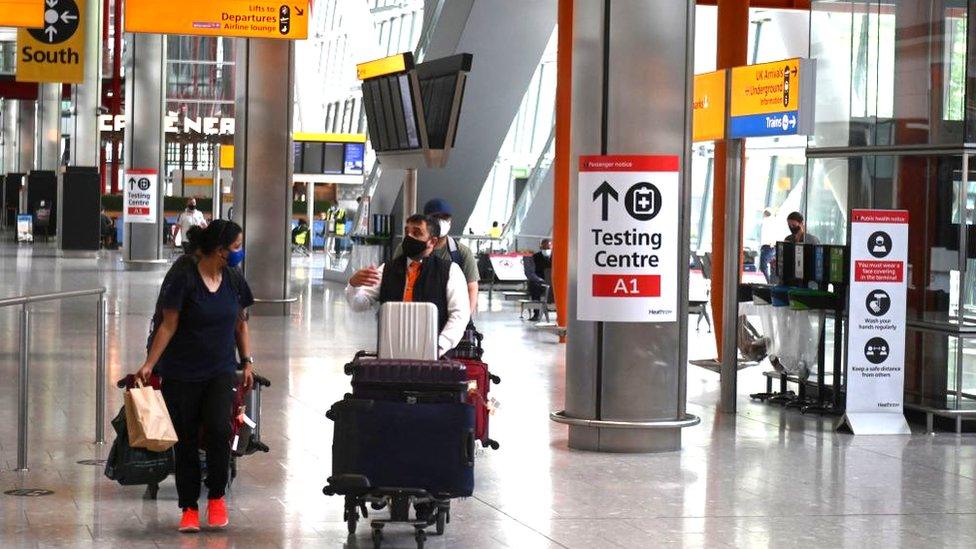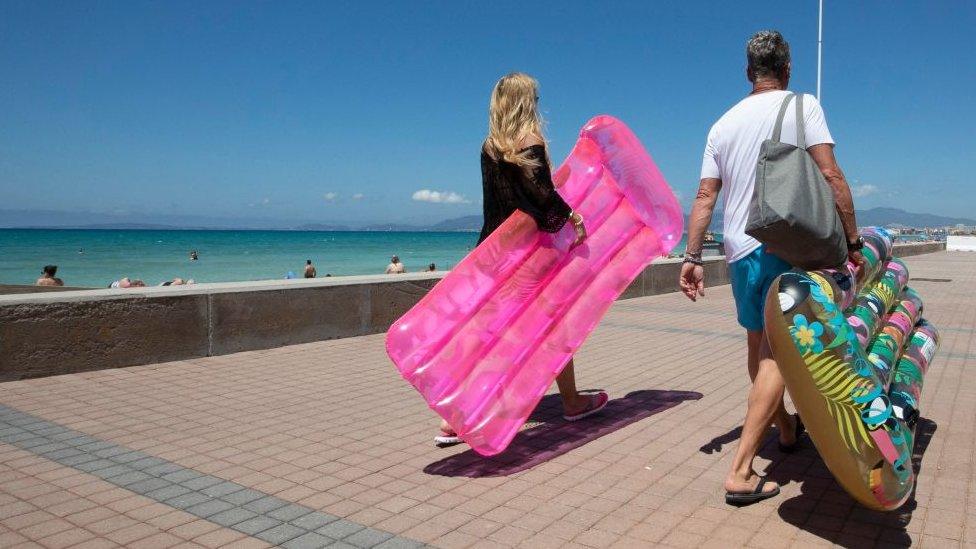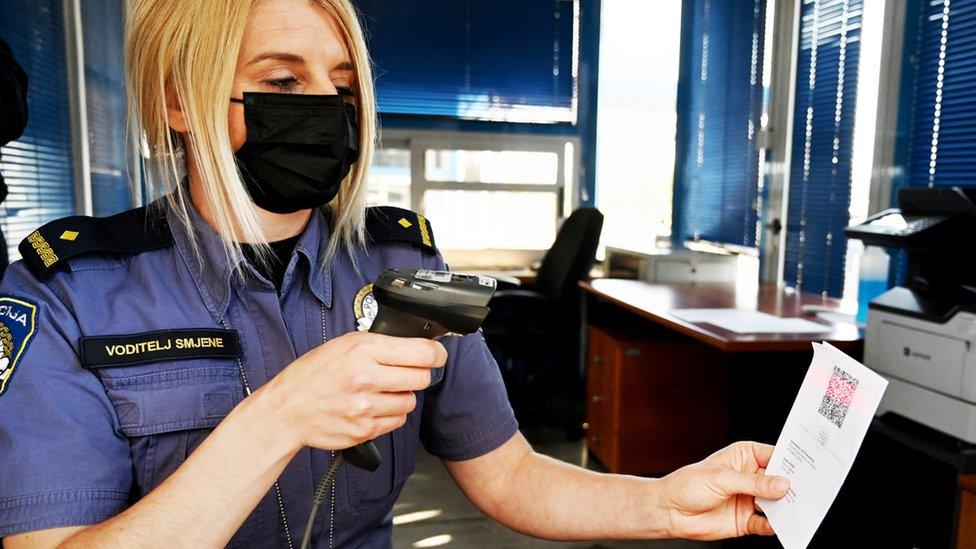Covid in Scotland: Calls for Scotland to follow English travel rules
- Published

Travel agents believe Scots will travel to English airports if the rules remain unchanged
Travel agents, airlines and tour operators want clarity from the Scottish government on travel rules as England prepares to open up.
The UK government has announced an end to the ten-day quarantine period for fully vaccinated passengers and children in England from 19 July.
The Scottish government has responsibility for quarantine rules north of the border.
But it has not yet said whether it will follow the same approach.
Without similar changes in Scotland, there have been concerns that people will travel to airports in England to avoid restrictions.
First Minister Nicola Sturgeon has said she is "carefully considering" what to do, with an announcement expected to be made next week.
Northern Ireland will follow England in removing quarantine rules for fully vaccinated people travelling to and from amber list countries from 26 July, while Wales - like Scotland - has not yet decided whether to do the same.
Travel businesses have called on the Scottish government to adopt a four nations approach to the issue.
Karen Dee, chief executive of the Airport Operators Association, told BBC Radio's Good Morning programme she believes there is no reason why Scotland's airports should be operating differently from other parts of the UK.
She said: "Aviation is a global industry and we have shown we can do this safely. We can follow the same rules and get going again.
"We have said to the government we need a risk-based approach. We can bring that risk down to something we think is proportionate.
"We simply cannot carry on with closure. If we want connectivity to be restored which is really important to Scotland's economy we have to get going again."
She added: "Absolutely what will happen is that Scots will fly from English airports. We can't make decisions without considering what our neighbours are doing. Decisions shouldn't be taken in isolation, we need at the very least a four-nations approach."

England will open for foreign travel to amber list countries from 19 Julu

What are the changes to English travel rules?
Adults will no longer have to quarantine for 10 days on return from an amber-list country, if they were fully vaccinated in the UK.
They will still need to pay for a test three days before returning to England, and a PCR test two days after arriving. There will no longer be a test on day eight.
They will have to prove they were vaccinated at least 14 days previously.
Children under 18 will no longer have to self-isolate. Children aged 10 and under will not have to take a test before departure for England. Those aged four and under will not need to take a test two days after arrival.
Fully-vaccinated passengers returning to Northern Ireland will no longer need to quarantine from 26 July (if the plans are confirmed on 22 July). Under-18s, participants of clinical trials and those with medical advice against vaccines will be treated as being fully vaccinated.
Scotland and Wales have yet to say whether they will follow these changes.

Since the announcement by UK Transport minister Grant Shapps earlier this week, travel agents, airlines and tour operators say interest in holidays to amber list countries has soared.
Jaqueline Dobson, president of Barrhead Travel, said she was disappointed the Scottish government did not taken similar action at the same time to open up travel for Scottish holidaymakers
She said: "Our English counterparts - industry and holidaymakers - are getting ready to make plans from 19 July, but once again Scotland is left in limbo.
"These plans were tentatively announced in June so we have to ask, why is this still under consideration?
"Given the lack of clarity for Scottish arrivals into England, there is also a significant risk that Scottish holidaymakers will begin to depart and arrive from English airports which will have huge long-term effects on our airports."

Holiday bookings have taken off since the announcement on quarantine
Joanne Dooey, president of The Scottish Passenger Agents' Association (SPAA), said Scottish travel agents and travellers need to know that Scotland will swiftly follow suit.
She added: "We continue to raise the question of travel certification and how Scotland will deliver a scheme to allow the public to provide proof of vaccination status in order to fly to other countries.
"Currently English travellers can use the NHS app to prove their certification status and this integrates with the EU Digital COVID Certificate (EUDCC) which gives digital proof of a traveller's vaccination, testing and recovered from COVID-19 status.
"The Scottish government needs, as a matter of urgency, to tell us what stage, if any, the development of a Scottish app is at."
She said Scots who wish to travel currently have to apply for a paper certificate, but argued that the country needs to be operating at the same level as other countries which have developed and are already using the technology.
'Situation fragile'
During Thursday's coronavirus briefing, Ms Sturgeon said she would "carefully consider" whether Scotland would follow England in allowing double-vaccinated travellers to return from about 140 amber list countries without having to quarantine.
The first minister said: "We will look carefully at the statement that's been made in the UK, and we'll come to a decision on that fairly soon in terms whether or not that will apply to people returning to Scotland."
Ms Sturgeon said she was not ruling anything out at this stage but stressed that the situation in Scotland remains fragile and the government needed to be careful.
Scotland has seen soaring infection levels in past weeks but Ms Sturgeon said on Thursday that the rate of new cases was slowing down.
Scotland registered 2,802 confirmed cases on Thursday and a further four deaths following a positive test.
On Friday Health Secretary Humza Yousaf announced that 100 additional contact tracing staff would support Scotland's Test and Protect system, after recent reports that the system was under pressure during a surge in cases.


- Published30 June 2021

- Published1 September 2021

- Published11 February 2022
